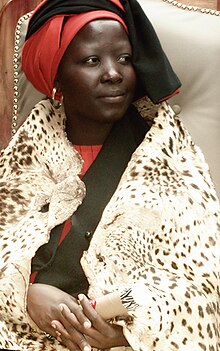And they are always ruled by a queen.
Men cannot inherit the throne of the Balobedu at all. Because rural African history tends to rely heavily on oral tradition it's impossible to know exactly when the matrilineal line started, but some sources (aka old Bolobedu people) believe it might have begun around the 16th century.
The Rain Queen shuns all public function and hangs out inside all day, which sounds awesome. Instead of marrying a man, she has multiple wives. The wives are all daughters of powerful village leaders, which ensures loyalty and maximum gossip access.
Her powers are considered so great that even the legendary Shaka Zulu sent his top diplomats to beg for her blessing. This is the guy who disposed of people he was annoyed with by locking them in houses with starving hyenas.
One of the most wonderful and fascinating things about the legacy of the Rain Queens is the respect they commanded from the surrounding tribes. The Rain Queens were so feared that the Balobedu were left in peace for centuries as territory wars raged around them.
It's a slight bummer that the Rain Queen is expected to commit suicide to pass on the throne when she feels her time is near, but such are the demands of the crown, I guess.
Queen Modjaji V was close friends with Nelson Mandela, and successfully campaigned for him to secure the resources to open schools in her area. It's difficult to encapsulate the politics and culture of even just a small region of South Africa in a few short sentences, but the fact that Queen Modjaji was willing to speak up and demand schooling for rural children - and was listened to - is remarkable. The Balobedus even have votes in the African National Congress.
Her daughter, Queen Mokobo Modjaji, was the first Rain Queen to be formally educated. Queen Mokobo was only 25 when she was crowned, and she immediately struck out against tradition. She was seen in public, used a cell phone, and was public about her lover. When she died in 2005, only two years after she took the throne, it was both sad and suspect, particularly when someone attempted to burn her body.
Because her daughter was so young, Queen Mokobo's brother took over as Prince Regent. In 2007, David Mohale apparently feared for his daughter's life and fled with her... but in 2008, she was back with the Prince Regent. It's impossible to find any information about either David Mohale or his daughter online.
Ostensibly, Princess Masalanabo will take the throne when she comes of age. (I'd recommend visiting that link - it's an interview with Prince Regent Mpapatla Modjaji.)
But it's hard to know anything for sure - the Prince Regent has a daughter as well, and there has been debate about whether she should inherit the throne instead. And, perhaps more significantly, on the website for the Balobedu's tourist attractions, the Prince Regent is styled as King Mpapatla Modjaji."We are waiting for my sister's daughter to come of age to take over. According to customary law she will assume her responsibilities when the family decides she is fit to rule.Age does not matter. The real school of learning takes place here at the royal house. The people must know me as their regent - not the rain king."
In a place where women cannot legally step foot in a courthouse, strong female representation is sorely needed. (If you want more info about women's rights - particularly black women's rights - in South Africa, the Women's Legal Centre is a fantastic resource.)
And since the last queen's death, the rain doesn't come.

This is interesting. It's always fun reading about something I didn't know.
ReplyDelete